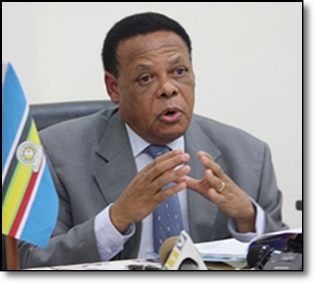EAC Braces for Monetary Union

 |
| Amb Juma Mwapachu |
We fundamentally embark on a new phase in our process of integration, an integration that is deeper. It is deeper because it also constitutes a form of political integration. One of the important symbols of political integration is a common currency. As we begin deliberations which will usher in the formal negotiations for the establishment of the East African Community Monetary Union in March this year, we begin a serious journey, whatever the length, towards the East African Political Federation.
The task before you is not an enviable one. It is complex in its political overtones and its sheer technical character. I do believe though that having been chosen to lead this process speaks volumes about your competences and your commitment to the goal that underlies your work. I also know that you have the benefit of a great deal of preparatory work that has been done and which should help lessen your burden of thought and, probably, of the nationaI political overhang! You have with you the Draft Monetary Union Protocol; a Draft East African Monetary Institute Bill; a Draft East African Central Bank Bill; and several other documents and literature of benefit to your work. A Draft Road-map to guide your process of negotiations has also been prepared for you and you will be required, at this meeting, to review it and agree on how you think you can proceed bearing in mind that the Summit expects you to be expeditious in coming up with final proposals.
I need not be the political mobiliser for deeper EAC integration to draw your attention to the reality that the eyes and ears of the East African citizens are, from today, centred on this Task Force. These people, across the age difference, have not lost their sense of history; that once upon a time, in the 1970s, this region had the most developed common market and monetary union in the world. The bravery and resolve of our independence political leaders made that possible. But they also let us down for reasons probably justified at the time.
However, the realities of the brave new world today demand that some of us lead a major consciousness change; that we need to integrate our economies more deeply and that the introduction of a common currency will provide a stronger and more solid basis for investment and economic growth. Certainly, for an efficient and effective common market to operate, a monetary union, and not simply the free movement of capital, is essential. This is because a monetary union helps to eliminate price instability and exchange rate volatility. And as a result, a competitive business environment that spurs investment flows and growth is garnered.
Our Heads of State at their last Summit meeting in Arusha on 3 December last year were
unequivocal about the integration stage we have reached in the EAC and of the need to expedite the process towards the establishment of the Monetary Union. They called upon the Partner states to fast track macro-economic convergence that constitutes the basic criteria for the monetary union. Yet, we know, as monetary specialists and as informed citizens that this is one of the challenging tasks that the High level Task Force will have to face and confront in the next 12 months of negotiations.
The reality is that some of the EAC Partner States have only recently emerged from years of turmoil and are only beginning to construct robust instruments of State. In the European Union, the process of monetary integration was hampered by varying degrees of convergence criteria - compliance which gave way to the adoption of an opting-out formula, call it variable geometry.
But then the EU was a significantly large family even before the later enlargement process. For the EAC, on the other hand, it is an issue of five members, at least for now! But this is clearly one of the critical issues that will have to be dispassionately considered in determining the pace and timing of the on-set of the monetary union.
The EAC Council of Ministers has already set up a special Sectoral Council of Ministers on Monetary Union to be directly involved in ensuring that your work as a High Task Force receives constant political oversight and direction. You will be assisted by the relevant statutory organs comprising officials, technical and Permanent Secretaries, cutting across sectors such as Ministries of Finance, Central Banks, Capital Markets, Pension Funds, and Revenue Authorities.
In other words, you have all the support you need to complete your work within one year.
It has been a privilege for me to work closely with the Governors of the EAC Partner States' Central Banks on this enterprise of great importance to our region. I have always found them to be a highly patriotic group, full of passion for regionalism but also always carrying a weighted frame of mind about the sensitivity of this next stage of EAC integration. We must thus continually engage these Governors as you proceed in your work to ensure that we finally create an institution that would be solid, robust and sustaining; not one that, in the face of the kind of crises the European Monetary Union finds itself in today, would spell disaster. As I complete my term of office at the end of April this year, be certain that as an ardent East African committed to deeper EAC integration I will continue to be watchful of how you undertake your work.
Opening Remarks by the Secretary General, East African Community, Ambassador Juma V. Mwapachu during the Meeting of the High Level Task Force on The EAC Monetary Union
